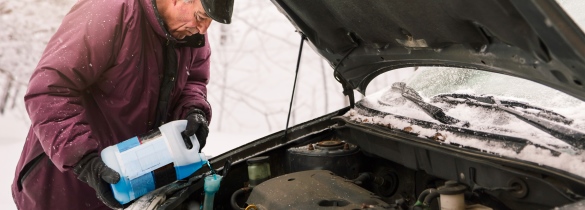Winters in metro Atlanta are usually mild … except when they aren’t. In 2014, thousands of motorists were caught off guard, and trapped in their cars, during an
ice storm that paralyzed traffic on Georgia highways and neighborhood streets.
Whether it’s blistering hot or 20 degrees below zero, weather at
any temperature affects road conditions. Before it gets seriously cold, set yourself up to save money on maintenance and protect your personal safety by making sure your ride is ready for winter.
- Antifreeze fluid keeps your engine from freezing when temperatures drop below 32 degrees. Without adequate antifreeze, your engine may not start, or it could shut off at a really bad time. Your owner’s manual should have directions for checking antifreeze levels, or have a professional mechanic do it for you.
- Your tire's tread depth and air pressure are important any time of year, and especially on wet or slushy roads. Your tires’ correct air pressure is listed inside the driver’s door frame; just use a simple gauge to make sure tires are properly inflated. To check tread depth, use the “Lincoln” test: insert a penny into the tread with Lincoln’s head pointing toward the center of the tire. If you can see Abe’s whole head, the tire probably needs replacing.
- Did you know windshield wiper fluid comes in a cold-weather version? In winter, regular wiper fluid can freeze instantly when it hits a cold windshield. But specially formulated fluid won’t freeze, and may even help loosen any ice and snow already stuck to a windshield.
- Motor oil also comes in different formulations and, generally, the colder the weather the thinner the oil should be. When you’re looking at motor oil labels, a lower number indicates better viscosity. For example, 5W-30 oil is a little thinner than 10W-30, so it may be better for your engine in winter months. Check with a mechanic if you’re unsure of the type your engine needs.
- Taking all these steps, and maybe even getting a complete engine tune-up, can ensure better gas mileage – which can help you save money. But if you do nothing else to winterize your ride, be sure to at least add an emergency kit to your car. During cold winter months, when being stranded presents the possibility of hypothermia, an emergency kit should include warm clothes, blankets, high-energy snacks, bottled water and a first aid kit. Check the National Safety Council website for other suggestions such as a flashlight, road flares, an ice scraper and a bag of sand (to put under your tires for traction).
Even in Georgia’s temperate conditions, preparing for winter weather should include a thorough evaluation of the automobile you own, or
the one you aspire to own. By taking a few steps to prepare your car for extreme cold you may keep it in better working order, save money on maintenance and, most importantly, protect your personal safety.



